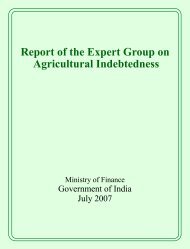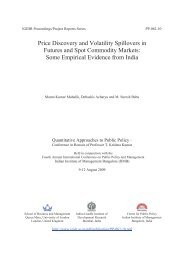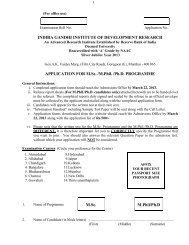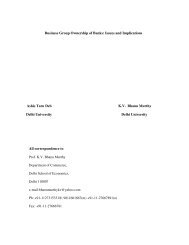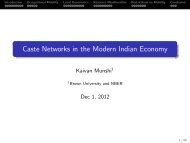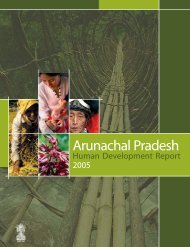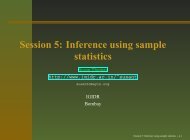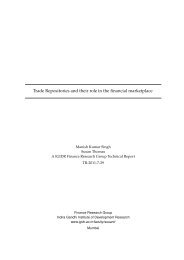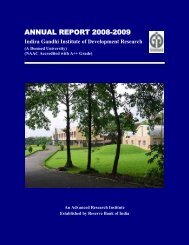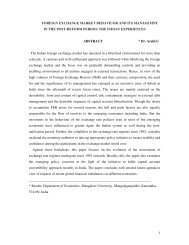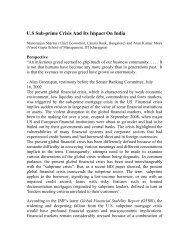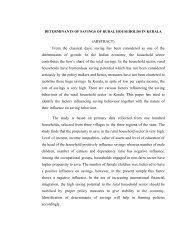- Page 1:
Human Development Report 2005 KERAL
- Page 4 and 5:
ii © Copyright 2006 Government of
- Page 6 and 7:
iv Location of Kerala
- Page 8 and 9:
vi Foreword Kerala has achieved int
- Page 10 and 11:
viii Message I have immense pleasur
- Page 12 and 13:
x It was at the invitation of the K
- Page 14 and 15:
xii It should be noted that the CDS
- Page 16 and 17:
xiv CHAPTER 8 CHAPTER 9 CHAPTER 10
- Page 18 and 19: xvi CHAPTER 4 4.1 District-wise Hum
- Page 20 and 21: xviii List of Figures Figure No. Fi
- Page 22 and 23: xx List of Maps Map No. Map Title P
- Page 24 and 25: xxii INCLEN International Clinical
- Page 26 and 27: xxiv Marumakkatayam Mavilan Nambudi
- Page 28 and 29: 2 that base, but primarily deals wi
- Page 30 and 31: 4 further improvement on the human
- Page 32 and 33: 6 functions are intimately related
- Page 34 and 35: 8 2. Present Day Kerala: A Profile
- Page 36 and 37: 10 to introduce the modern system o
- Page 38 and 39: 12 the nationalist movement followe
- Page 40 and 41: 14 2.2.5 The Post-Independence Peri
- Page 42 and 43: 16 In more recent years, however, o
- Page 44 and 45: 18 was also a compelling internal d
- Page 46 and 47: 20 2. Demographic and Health Indica
- Page 48 and 49: 22 Table 2.3: Overall Sex Ratio and
- Page 50 and 51: 24 Table 2.5: Marriage Indicators b
- Page 53 and 54: CHAPTER 2 ASSESSING DEVELOPMENT: SO
- Page 55 and 56: CHAPTER 2 ASSESSING DEVELOPMENT: SO
- Page 57 and 58: CHAPTER 2 ASSESSING DEVELOPMENT: SO
- Page 59 and 60: CHAPTER 2 ASSESSING DEVELOPMENT: SO
- Page 61 and 62: CHAPTER 2 ASSESSING DEVELOPMENT: SO
- Page 63 and 64: CHAPTER 2 ASSESSING DEVELOPMENT: SO
- Page 65 and 66: CHAPTER 2 ASSESSING DEVELOPMENT: SO
- Page 67: CHAPTER 2 ASSESSING DEVELOPMENT: SO
- Page 71 and 72: CHAPTER 3 ASSESSING DEVELOPMENT: TH
- Page 73 and 74: CHAPTER 3 ASSESSING DEVELOPMENT: TH
- Page 75 and 76: CHAPTER 3 ASSESSING DEVELOPMENT: TH
- Page 77 and 78: CHAPTER 3 ASSESSING DEVELOPMENT: TH
- Page 79 and 80: CHAPTER 3 ASSESSING DEVELOPMENT: TH
- Page 81 and 82: CHAPTER 3 ASSESSING DEVELOPMENT: TH
- Page 83 and 84: CHAPTER 3 ASSESSING DEVELOPMENT: TH
- Page 85 and 86: CHAPTER 4 Human Development in Kera
- Page 87 and 88: CHAPTER 4 HUMAN DEVELOPMENT IN KERA
- Page 89 and 90: CHAPTER 4 HUMAN DEVELOPMENT IN KERA
- Page 91 and 92: CHAPTER 4 HUMAN DEVELOPMENT IN KERA
- Page 93 and 94: CHAPTER 4 HUMAN DEVELOPMENT IN KERA
- Page 95 and 96: CHAPTER 5 Human Development and Eco
- Page 97 and 98: CHAPTER 5 HUMAN DEVELOPMENT AND ECO
- Page 99 and 100: CHAPTER 5 HUMAN DEVELOPMENT AND ECO
- Page 101 and 102: CHAPTER 5 HUMAN DEVELOPMENT AND ECO
- Page 103 and 104: Since employment opportunities were
- Page 105 and 106: CHAPTER 5 HUMAN DEVELOPMENT AND ECO
- Page 107 and 108: CHAPTER 5 HUMAN DEVELOPMENT AND ECO
- Page 109 and 110: CHAPTER 5 HUMAN DEVELOPMENT AND ECO
- Page 111 and 112: CHAPTER 6 Reckoning Promise A CRITI
- Page 113 and 114: CHAPTER 6 RECKONING PROMISE: KERALA
- Page 115 and 116: CHAPTER 6 RECKONING PROMISE: KERALA
- Page 117 and 118: CHAPTER 6 RECKONING PROMISE: KERALA
- Page 119 and 120:
CHAPTER 6 RECKONING PROMISE: KERALA
- Page 121 and 122:
CHAPTER 6 RECKONING PROMISE: KERALA
- Page 123 and 124:
CHAPTER 6 RECKONING PROMISE: KERALA
- Page 125 and 126:
CHAPTER 7 Reckoning Caution EDUCATE
- Page 127 and 128:
CHAPTER 7 RECKONING CAUTION: EDUCAT
- Page 129 and 130:
CHAPTER 7 RECKONING CAUTION: EDUCAT
- Page 131 and 132:
CHAPTER 7 RECKONING CAUTION: EDUCAT
- Page 133 and 134:
CHAPTER 7 RECKONING CAUTION: EDUCAT
- Page 135 and 136:
CHAPTER 7 RECKONING CAUTION: EDUCAT
- Page 137 and 138:
CHAPTER 7 RECKONING CAUTION: EDUCAT
- Page 139 and 140:
CHAPTER 7 RECKONING CAUTION: EDUCAT
- Page 141 and 142:
CHAPTER 7 RECKONING CAUTION: EDUCAT
- Page 143 and 144:
CHAPTER 7 RECKONING CAUTION: EDUCAT
- Page 145 and 146:
CHAPTER 7 RECKONING CAUTION: EDUCAT
- Page 147 and 148:
CHAPTER 7 RECKONING CAUTION: EDUCAT
- Page 149 and 150:
CHAPTER 7 RECKONING CAUTION: EDUCAT
- Page 151 and 152:
CHAPTER 8 Looking Ahead POSSIBILITI
- Page 153 and 154:
CHAPTER 8 LOOKING AHEAD: POSSIBILIT
- Page 155 and 156:
CHAPTER 8 LOOKING AHEAD: POSSIBILIT
- Page 157 and 158:
CHAPTER 8 LOOKING AHEAD: POSSIBILIT
- Page 159 and 160:
CHAPTER 8 LOOKING AHEAD: POSSIBILIT
- Page 161 and 162:
CHAPTER 8 LOOKING AHEAD: POSSIBILIT
- Page 163 and 164:
CHAPTER 8 LOOKING AHEAD: POSSIBILIT
- Page 165 and 166:
CHAPTER 8 LOOKING AHEAD: POSSIBILIT
- Page 167 and 168:
CHAPTER 8 LOOKING AHEAD: POSSIBILIT
- Page 169 and 170:
CHAPTER 9 Decentralised Governance
- Page 171 and 172:
CHAPTER 9 DECENTRALISED GOVERNANCE
- Page 173 and 174:
CHAPTER 9 DECENTRALISED GOVERNANCE
- Page 175 and 176:
CHAPTER 9 DECENTRALISED GOVERNANCE
- Page 177 and 178:
CHAPTER 9 DECENTRALISED GOVERNANCE
- Page 179 and 180:
CHAPTER 9 DECENTRALISED GOVERNANCE
- Page 181 and 182:
CHAPTER 9 DECENTRALISED GOVERNANCE
- Page 183 and 184:
CHAPTER 9 DECENTRALISED GOVERNANCE
- Page 185 and 186:
CHAPTER 10 By Way of Conclusion SUG
- Page 187 and 188:
CHAPTER 10 BY WAY OF CONCLUSION: SU
- Page 189 and 190:
CHAPTER 10 BY WAY OF CONCLUSION: SU
- Page 191 and 192:
CHAPTER 10 BY WAY OF CONCLUSION: SU
- Page 193 and 194:
CHAPTER 10 BY WAY OF CONCLUSION: SU
- Page 195 and 196:
TECHNICAL NOTE 169 An index has bee
- Page 197 and 198:
TECHNICAL NOTE 171 Table 3: Gender
- Page 199 and 200:
TECHNICAL NOTE 173 source is consid
- Page 201 and 202:
DISTRICT PROFILES 175 Kollam Indice
- Page 203 and 204:
DISTRICT PROFILES 177 Alappuzha Ind
- Page 205 and 206:
DISTRICT PROFILES 179 Idukki Indice
- Page 207 and 208:
DISTRICT PROFILES 181 Thrissur Indi
- Page 209 and 210:
DISTRICT PROFILES 183 Malappuram In
- Page 211 and 212:
DISTRICT PROFILES 185 Wayanad Indic
- Page 213 and 214:
DISTRICT PROFILES 187 Kasaragod Ind
- Page 215 and 216:
REFERENCES 189 Bloom, D. E. & Willi
- Page 217 and 218:
REFERENCES 191 Halliburton, Murphy
- Page 219 and 220:
REFERENCES 193 Keynes, J. M. (1930)
- Page 221 and 222:
REFERENCES 195 Nelson, Nici and Wri
- Page 223 and 224:
REFERENCES 197 Sen, A. (1999) Devel
- Page 225:
199 List of Background Papers Achin



